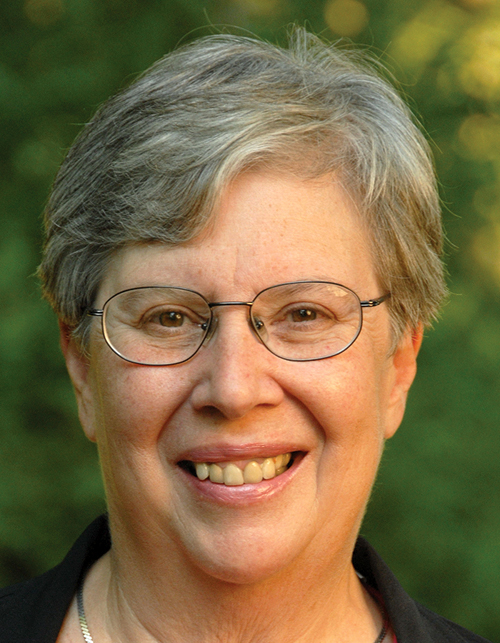Berman recognized for her work removing barriers to data access
has won the 2013 from the 涩里番. Berman, a professor at Rutgers University and co-founder of the , is being honored for her efforts to make data universally available.
 “I am deeply honored to be a recipient of the DeLano award that recognizes the importance of the availability of computational resources for biological research.” –HELEN BERMAN
“I am deeply honored to be a recipient of the DeLano award that recognizes the importance of the availability of computational resources for biological research.” –HELEN BERMAN
“From the earliest point in her career, she worked within the scientific community to set up guidelines to ensure that such universal access would be possible,” explained of Rutgers University in her nomination of Berman. She continued: “Motivating these efforts was her strong conviction that it would be possible to create new knowledge from systematic analyses of data. While this concept seems obvious today, it was visionary when she began to promote the idea in the early 1970s.”
About 25 new structures now are submitted to the PDB each day, and more than 88,000 structures have been made available since it was established in 1971. (Berman, who today directs the Research Collaboratory for Structural Bioinformatics PDB, has contributed 38 of those structures.) Berman also was involved in creating the of structures. Her contributions to the PDB and databases of the sort have had a profound impact on how we study biology.
wrote in support of Berman’s nomination for the award, “I think it is incontestable that disappearance of the PDB would leave a larger hole in macromolecular science than the loss of any other single computer-based system and also that Helen is the person who deserves the most credit for that.”
Berman began studying crystallography at the Columbia University College of Physicians and Surgeons during her undergraduate years at Barnard College. Her interest followed her to the University of Pittsburgh, where she worked under the direction of and received, in a mere three years, her Ph.D. in crystallography in 1967. She stayed on at Pittsburgh for a postdoctoral stint and later moved to the Fox Chase Cancer Center, where she started her own lab and focused for 20 years on nucleic acid crystallography and the interactions between nucleic acids and drugs. In 1989, she joined the faculty at Rutgers and went on to expand her crystallographic program to include the study of collagen and protein-nucleic acid complexes. Berman became director of the PDB in 1998 and in 2003 co-founded the Worldwide PDB organization that now manages the PDB archive.
Education is another facet of Berman’s extraordinary career: She has mentored numerous high-school, undergraduate and graduate students and postdoctoral fellows. at The European Bioinformatics Institute explained, “Obviously, as a professor, she has been involved in education, but her commitment goes well beyond the normal devotion to duty. Within the PDB she has always devoted considerable energy and funds to ensuring that the PDB is accessible to school children and young undergraduates. Her work has made these complex structures much more accessible to these young people, the scientists of the future.”
Berman will receive her award during the Experimental Biology 2013 conference in Boston, where she will deliver an award lecture. The presentation will take place at 2:55 p.m. April 22 in the Boston Convention and Exhibition Center.
Enjoy reading ASBMB Today?
Become a member to receive the print edition four times a year and the digital edition monthly.
Learn moreGet the latest from ASBMB Today
Enter your email address, and we鈥檒l send you a weekly email with recent articles, interviews and more.
Latest in People
People highlights or most popular articles

Survival tools for a neurodivergent brain in academia
Working in academia is hard, and being neurodivergent makes it harder. Here are a few tools that may help, from a Ph.D. student with ADHD.

Quieting the static: Building inclusive STEM classrooms
Christin Monroe, an assistant professor of chemistry at Landmark College, offers practical tips to help educators make their classrooms more accessible to neurodivergent scientists.

Hidden strengths of an autistic scientist
Navigating the world of scientific research as an autistic scientist comes with unique challenges 鈥攎icroaggressions, communication hurdles and the constant pressure to conform to social norms, postbaccalaureate student Taylor Stolberg writes.

Richard Silverman to speak at ASBMB 2025
Richard Silverman and Melissa Moore are the featured speakers at the ASBMB annual meeting to be held April 12-15 in Chicago.

Women鈥檚 History Month: Educating and inspiring generations
Through early classroom experiences, undergraduate education and advanced research training, women leaders are shaping a more inclusive and supportive scientific community.

ASBMB honors Lawrence Tabak with public service award
He will deliver prerecorded remarks at the 2025 ASBMB Annual Meeting in Chicago.

